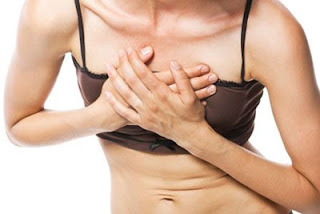A specialized medical journal of the United States, entitled "Clinical Cardiology", recently published a new study about the cause of heart attack and stroke.
Results of the study showed that the crystalline cholesterol buildup of plaque inside blood vessels as the culprit causing this illness.
Previously, scientists said that when the plaques in blood vessels rupture and cause blockage often causes heart attacks and strokes.
Professor Gioocgio S. Abela at the University of Michigan said when cholesterol crystallizes, two phenomena can occur: first, if a large "pool" cholesterol liquid, it will spread out and puncture the walls of blood vessels; second, if a crystal sharp as needle-like structure, it will break through into the same circuit as the nails into the wood.
According to Prof. Abela, ever, in the process of treating and preventing heart disease and stroke, the medical community is not paying attention to the process of cholesterol crystals.
With this new discovery, the researchers hope to find new treatments, more effective for this disease.
Thursday, November 8, 2012
Heart attack - causes unexpected
When it comes to heart disease, people usually think of diet and lifestyle, but there are also reasons that you would never think that it is likely to be harmful to the heart.
Where you live. A study of heart attack in the last 9 years in those aged 45-64 years showed that people in low-income neighborhoods has increased to three times the chance of getting heart disease than peers with similar income education and work but live in high-income residential areas.
Antibiotics. Antibiotic azithromycin has a high risk of death in people with heart disease.
Calcium supplementation. A recent study in the journal Heart made in 23,000 people found that those eating calcium supplement on the road at risk of heart attack than others.
Infection. If you are diagnosed with the flu or a respiratory infection, the risk of you having a heart attack is five times higher. When an infection causes inflammation, trigger a heart attack or stroke.
Psoriasis. Psoriasis is a cause of heart level with diabetes.
The relationship is not good. The bad relationship can cause damage to the heart both literally and figuratively. According to a study by the Institute of Epidemiology at the University of London, bad relationships can increase 34% the risk of heart disease.
Low good cholesterol. A study of nearly 7,000 people by a researcher at the University of Indiana (USA) analyzed the relationship between cholesterol and coronary heart disease. The study concluded that low cholesterol is the third largest cause of coronary artery disease after heart disease and age.
Kidney problems. A study of elderly patients in Rotterdam in the Netherlands found that those with weak kidneys also are at high risk of heart attack. Another study conducted in 10,000 men found that those with chronic kidney disease will be 2 times the risk of heart attack compared to those without kidney disease.
Urban living. According to a study by German scientists, whether you are traveling by car, bike, or public transportation can double the risk of heart attack. A previous study also found that deaths from heart disease, lung mostly people who live near major roads.
Where you live. A study of heart attack in the last 9 years in those aged 45-64 years showed that people in low-income neighborhoods has increased to three times the chance of getting heart disease than peers with similar income education and work but live in high-income residential areas.
Antibiotics. Antibiotic azithromycin has a high risk of death in people with heart disease.
Calcium supplementation. A recent study in the journal Heart made in 23,000 people found that those eating calcium supplement on the road at risk of heart attack than others.
Infection. If you are diagnosed with the flu or a respiratory infection, the risk of you having a heart attack is five times higher. When an infection causes inflammation, trigger a heart attack or stroke.
Psoriasis. Psoriasis is a cause of heart level with diabetes.
The relationship is not good. The bad relationship can cause damage to the heart both literally and figuratively. According to a study by the Institute of Epidemiology at the University of London, bad relationships can increase 34% the risk of heart disease.
Low good cholesterol. A study of nearly 7,000 people by a researcher at the University of Indiana (USA) analyzed the relationship between cholesterol and coronary heart disease. The study concluded that low cholesterol is the third largest cause of coronary artery disease after heart disease and age.
Kidney problems. A study of elderly patients in Rotterdam in the Netherlands found that those with weak kidneys also are at high risk of heart attack. Another study conducted in 10,000 men found that those with chronic kidney disease will be 2 times the risk of heart attack compared to those without kidney disease.
Urban living. According to a study by German scientists, whether you are traveling by car, bike, or public transportation can double the risk of heart attack. A previous study also found that deaths from heart disease, lung mostly people who live near major roads.
Thursday, November 1, 2012
Exercise helps prevent heart attacks
Recent U.S. study
showed that the risk of a second heart attack reduced 60% in those who remain active after the first
heart attack, compared with those who did not exercise. This is the first works
use of a large number of patients to analyze the effects of exercise after a
heart attack.
However, according to
the cardiologist, exercise must be consistent with the patient's health status
as well as the severity of the heart attack, in order to avoid overloading the
heart. The slow movement, but the long form such as walking, cycling are
important because they reduce the levels of cholesterol and lipids. In addition,
the exercise strengthens the upper part of the body is also essential, because
the operation of the arms and upper body often causes fatigue to heart so much.
In addition to
preventing heart attack, exercise is also an effective remedy for many diseases.
Previous studies have shown that the performance usually adjust better,
thinking more clearly, less heart disease related to stress, less anxiety or
depression.
Handling of heart when it comes to the emergency
Heart attack is one of
the leading causes of death in the world. The main reason is because there is
no emergency measures timely and appropriate from a heart attack until taken to
the hospital.
Here are some
guidelines needed to help you cope in this situation:
- Every minute is
very important, so be quick handling. Do not give anything by mouth to
patients, even a little better, it should be taken to the nearest hospital as
soon as possible. Remember that no one at the appropriate therapy for heart
attack patients.
- Place the
patient lie down, loosen clothing and taken to the emergency room immediately.
For patients to chew an aspirin and swallowed completely.
- Set Sorbitrate
under the tongue. If there are signs of sweating a lot, such as hypotension,
should not.
- You can put a
teaspoon of powdered glucose constant on or under the tongue. Not a drink
sweet.
- If a person is signs
are not aware, should apply cardiopulmonary resuscitation techniques - lungs
(CPR: airway, breathed breaths, pressing the sternum to stimulate the heart).
- Be patient
approach to medical equipment as quickly as possible, do not over use the
emergency on spot.
- Anatomy of the
secondary circuit is the method gives results immediately after a heart attack
within the first 90 minutes.
Wednesday, October 31, 2012
How to recognize early heart attack
In movies, people with
heart attacks often hug the left chest and collapsed to the floor. In fact,
many heart attacks occur slowly, patients only experience mild discomfort or
pain in the chest. These irregularities are overlooked. Patients go to the doctor
only when lesions persist in the heart.
Here are some warning
signs of a heart attack.
- Chest discomfort:
Most heart attacks cause discomfort in the center of the chest. This attack
lasted several minutes or repeated. The patient may feel like armor forced
contraction of the heart or feel pain.
- Discomfort in other
areas of the upper half (shoulders, neck, jaw, arms, back): This sign is
usually accompanied by discomfort in the chest, but may also appear. Here are
some typical location of pain or discomfort in patients with heart disease:
- Shortness of breath:
This symptom often occurs with unpleasant feelings in the chest, but may also
appear.
- Other signs: and cold
sweat, nausea, weakness and dizziness.
If you or someone next
to you start to feel chest discomfort, especially with one or more signs of a
heart attack, call an ambulance. Period of time from when the first signs
appear, and when the patient is cured can mean the difference between life and
death.
Subscribe to:
Posts (Atom)

